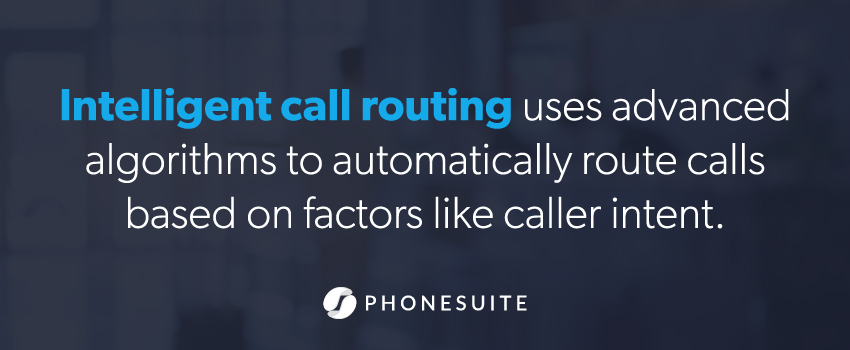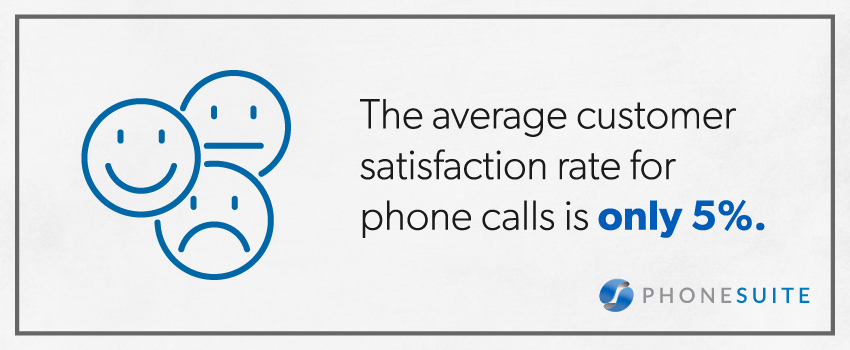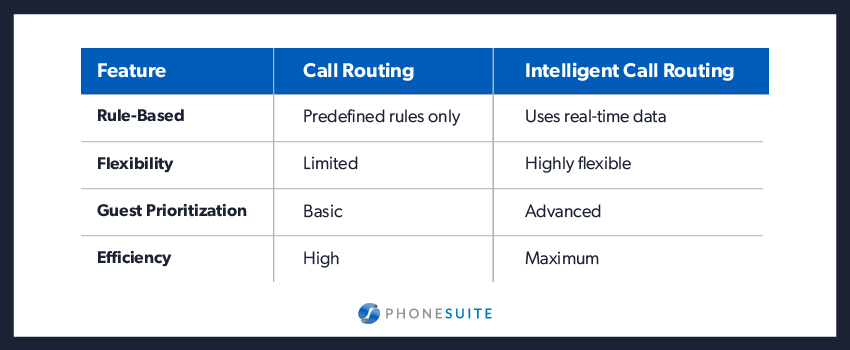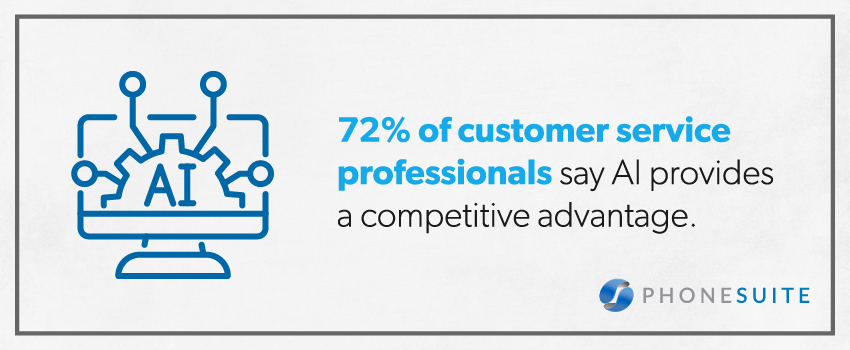In the hospitality industry, providing excellent communication is essential to delivering a memorable customer experience. Whether guests are making a reservation, inquiring about amenities, or requesting room service, how quickly their needs are addressed can make all the difference – especially with 77% of consumers expecting to interact with someone immediately when they reach out.
That’s where call routing comes in. Call routing is a telephony feature that ensures calls are routed to the right person or department. For hospitality businesses like hotels and restaurants, this feature can enhance service, minimize missed opportunities, and improve operational efficiency.
Read on to learn everything you need to know about call routing and what it can do for your communication strategy.
How Does Call Routing Work?
Call routing follows predetermined rules to automatically direct incoming phone calls. These rules can be simple, like sending all calls to the front desk during business hours, or complex, like prioritizing VIP guests based on caller ID or account history.
Modern phone systems often include intelligent call routing, which takes this functionality a step further by using advanced algorithms to make routing decisions based on factors like:
-
- The caller’s language or region
- Time of day
- Availability of staff
- Caller intent (e.g., reservations vs. guest services)
This approach helps your team members handle every call promptly and appropriately, reducing frustration for guests and staff alike.

Types of Call Routing
Depending on your property’s size, operational complexity, and guest expectations, certain types of call routing may be more helpful for your business. Let’s explore the different types of call routing and their applications.
Time-Based Routing
Time-based routing directs calls based on the day of the week or time of day. For example, calls may be routed to additional staff members during peak hours, while after-hours calls are sent to voicemail or a night manager.
Time-based routing helps ensure each call is answered, even during off-peak times, which is essential for businesses like hotels that operate 24/7.
Skill-Based Routing
Skill-based routing connects callers with the most qualified staff member available to handle their inquiries. For example, a guest calling about a billing issue may be routed to the accounting team, while someone asking about amenities would be routed to the guest services team.
This type of call routing improves efficiency by directing callers to the right staff member right away, allowing for quicker, more accurate responses and enhancing guest satisfaction.
Geographic Routing
Geographic routing directs incoming calls based on the caller’s location. For instance, geographic routing can connect a person calling a hotel chain with the nearest property to simplify the process and reduce wait times.
This is particularly helpful for hotels with multiple properties, as it connects guests to the right location without needing to navigate complex menus.
Intelligent Call Routing
Intelligent call routing uses real-time data and advanced algorithms to make smarter routing decisions. For example, the system might automatically prioritize VIP guests based on their history or membership status so that their call is handled promptly.
This approach helps hospitality businesses ensure that every call is handled as efficiently as possible, improving the overall guest experience.

4 Benefits of Call Routing for Hospitality Businesses
Guest expectations for faster, more personalized service are higher than ever. Here’s how call routing helps hotels and other hospitality businesses meet – and exceed – these evolving expectations:
1. Improved Guest Experience
The average customer satisfaction rate for phone calls is only 5%.1 With call routing, guests are less likely to experience long hold times or be transferred multiple times. Instead, they’re connected directly to the person or department best equipped to handle their request for a smoother, more streamlined experience.
2. Increased Staff Efficiency
Call routing automates the process of directing calls, allowing hotel staff to focus on in-person guest interactions or other critical tasks. Rather than answering calls that a call routing system could easily route to the right department, staff can focus on providing personalized services.
3. Reduced Missed Calls
Missed calls can mean missed opportunities for reservations, service requests, or important guest inquiries. Call routing ensures that every call is answered, even during high-traffic periods or when certain staff members are unavailable.
4. Scalability
As your business grows or adds new properties, call routing systems can scale with your needs. Modern phone systems are highly flexible, making it easy to adjust your call routing capabilities when expanding your front desk, adding more departments, or introducing new services.
Call Routing vs. Intelligent Call Routing: What’s the Difference?
While traditional call routing can be highly effective for hotels and other hospitality businesses, intelligent call routing takes the process to the next level. Let’s take a closer look at the biggest differences:

Ultimately, choosing between these options for your hotel will depend on the complexity of your communication needs. However, many hospitality businesses are opting for intelligent call routing as guest expectations continue to rise.
Tips for Choosing the Right Call Routing System for Your Hotel
When selecting a call routing system, you’ll need to consider your property’s unique needs and goals. Here are a few factors to keep in mind:
Customization
Look for a routing system that lets you create custom rules that align with your hotel’s structure, such as prioritizing certain types of calls or setting up custom schedules for peak and off-peak periods.
Scalability
Your system should be able to grow with your business, accommodating new properties, staff, or departments as needed without sacrificing efficiency.
Integration
Choosing a call routing system that integrates with your existing technology, such as your Customer Relationship Management (CRM) software or Property Management System (PMS), can result in smoother data synchronization.
Ease of Use
The system should be intuitive and easy for your staff to manage. A user-friendly interface ensures that staff can make updates or adjustments quickly without extensive training.
Support and Reliability
Finally, make sure your provider offers robust support and has a reliable system that minimizes downtime. Hotel operations run around the clock, so it’s critical to have a system that works without interruptions.

What Does the Future of Call Routing Look Like?
Call routing is continually evolving as new technologies emerge. Artificial intelligence (AI) already plays a major role in this space, with 72% of customer service professionals saying AI provides a competitive advantage.
AI enables more sophisticated routing decisions based on caller intent rather than a predefined menu. For example, AI can analyze the nature of a call in real time and direct it to the best department to reduce friction in the communication process.
Additionally, as voice recognition and natural language processing technology improve, call routing systems will become even more intuitive and user-friendly, further solidifying them as an essential tool for the hospitality industry.
Transform Your Hospitality Communication With Phonesuite
At Phonesuite, we understand the unique communication challenges hospitality businesses face. That’s why we’ve developed advanced phone system solutions that not only streamline your operations but also elevate the guest experience.
Our phone systems integrate seamlessly with your existing infrastructure, offering access to must-have features like call routing, room status updates, call management, and more. Whether you’re running a boutique hotel or a large chain, our cloud-based phone solutions can help you deliver the efficient, personalized service your guests expect.
Ready to take your communication to the next level? Contact us today to learn how Phonesuite can give you all the features and functionality you need – with none of the problems.
Sources:



